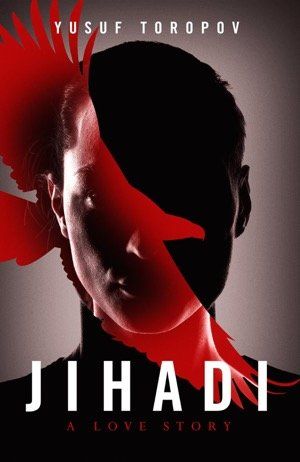
Written by Yusuf Toropov — The word ‘jihadi’ conjures up a very distinct image in the minds of most westerners: masked men in the desert clutching AK-47s, standing over their victims. It’s a preconception that’s far removed from the two so-called jihadis involved in this self-proclaimed love story. The word ‘jihad’ itself merely means ‘striving’ – it’s a way for Muslims to apply themselves to serving God’s will, which can take on many different forms. Author Yusuf Toropov’s Twitter handle is @LiteraryStriver – suggesting his own personal jihad is a literary one.
Jihadi: A Love Story takes place in the fictional Islamic Republic, which could be one of three or four different countries, but in this context appears modeled on Afghanistan. The two central characters in Jihadi are American born interpreter Fatima A and Ali Liddell, a senior American intelligent captured by Fatima’s employers, the Bureau of Islamic Investigation (BII). Ali retells his story on paper smuggled into his cell at a federal facility in Virginia, where he was moved after his recapture by the US for revealing state secrets. It is interspersed with notes from RL Firestone, the US agent responsible for Liddell’s interrogation and possibly death by torture. It slowly becomes apparent that she is Becky Firestone, who hired and later married Liddell, before separating from him. Her notes sometimes reveal contradictions in Ali’s story, and also justify the American actions in apprehending a former agent who they now see as a terrorist threat.
Liddell’s tale is not only the love story referred to in the title. It also recounts the tales of US marine Mike Mazzoni, who Fatima and another woman see urinating on a copy of the Koran, and Abu Islam, the self-proclaimed ‘father of Islam’ who leads a sect of white-clad religious fundamentalists, which grows in size to over a hundred thousand. Both Liddell and Firestone are quick to point out that there is no way that Liddell could have known about the events he retells, which adds to the sense of discord and chaos running through the two narratives.
Firestone’s notes drift further and further from the topic of Liddell’s story and add to the confusion. As you begin to piece together the narrative it becomes clear how events in each character’s past led them to their current position, and you can draw a connection between the murderous American soldiers and the murderous Islamic fundamentalists, and see a link between the BII’s prison and the American facility, both practicing torture to meet their self-justified ends.
This nuanced manner in which both sides are presented is one of the greatest strengths of Jihadi. By eschewing a simple, linear narrative Toporov is able to present viewpoints that would often be ignored in favour of simplistic tales of good versus. Unfortunately all of this good storytelling is often fractured by Firestone’s rambling asides, which descend into racism against the housekeeper at the hotel she’s staying at, and constant (though oblique) references to The Beatles’ White Album. These references would leave even the most die-hard Beatles fan scratching their head, and add little to our understanding of her as a character. In these sections Jihadi crosses the line from being a complex novel about war, love and religion, and becomes jumbled and chaotic. The three themes are of course jumbled and chaotic in themselves, which may have something to do with the novel’s structure being this way, but for me it simply stood in the way of enjoying what was otherwise a highly-original, engaging and thought-provoking literary thriller.
Orenda Books
Print/Kindle
£4.29
CFL Rating: 4 Stars